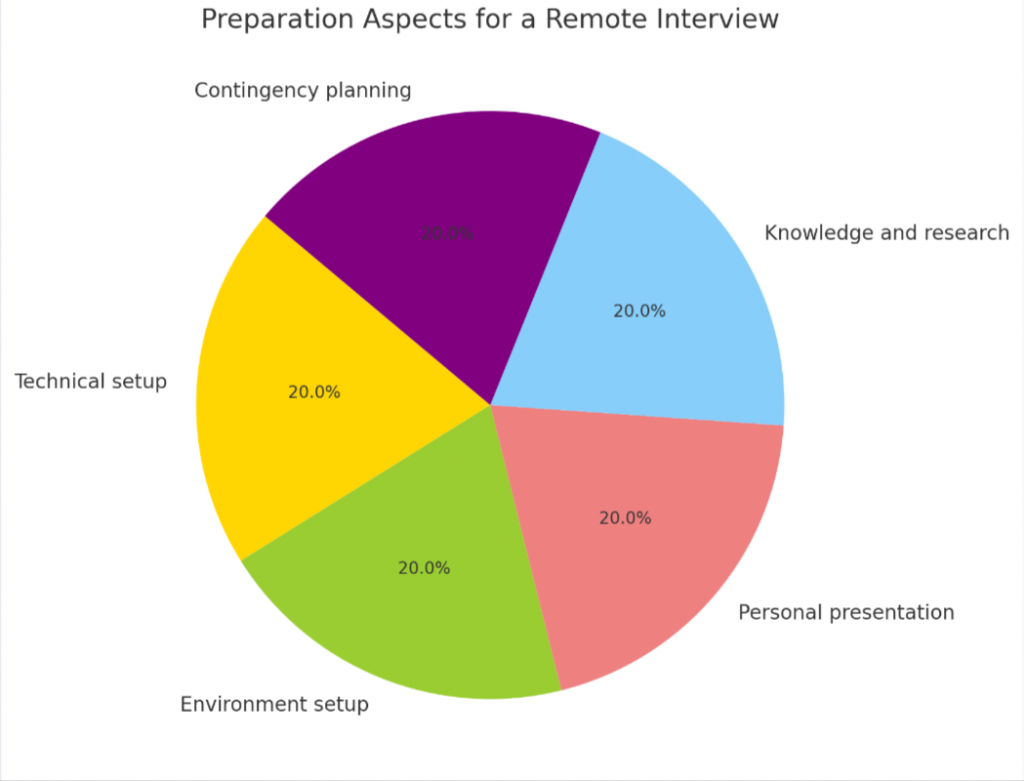Mastering the Remote Social Media Job Interview: Strategies for Success
Preparing for a remote social media job interview might feel like uncharted territory. With the rapid rise of remote hiring, it’s becoming more crucial than ever to master the art of virtual interviews.
This blog post provides a step-by-step guide on how to prepare effectively and perform confidently in your upcoming interview, setting you apart from other candidates. Let’s dive in and gear up for success!
Key Takeaways
- Choose a quiet and well – lit space for your remote interview to ensure you are seen and heard clearly.
- Invest in a high – quality webcam and microphone to present yourself professionally during the interview.
- Test your equipment before the interview to avoid technical issues that may disrupt the conversation.
- Dress appropriately for the remote job interview, aiming for a business or smart casual look.
- Thoroughly research the company and position to tailor your answers and show genuine interest.
- Practice potential interview scenarios to build confidence and be prepared for any question or situation.
- Maintain good eye contact and body language during the interview to create a strong virtual presence.
- Keep your resume and relevant documents ready for easy reference during the interview.
Setting Up for a Remote Interview
Choose a quiet and well-lit space for your remote interview, ensuring you have a high-quality webcam and microphone, and test your equipment prior to the interview.
Choosing a Quiet and Well-lit Space
A quiet and well-lit space is crucial for conducting a successful remote job interview. Adequate lighting allows the interviewer to see you clearly, while minimal background noise ensures your responses are heard without disruption.
Select a location that wouldn’t distract the interviewer’s attention away from you. Perhaps it could be an uncluttered corner of your living room or a wall-mounted shelf in your study room with natural light streaming in – both these options offer aesthetic appeal while maintaining professionalism during the interview process.
This setting not only exhibits preparedness but also demonstrates respect for your potential employer as it creates an environment conducive to focused conversation. Your chosen spot should effectively minimize potential interruptions such as loud traffic sounds or family members moving around, allowing you and the interviewer to maintain engagement throughout the discussion without disturbance.
Ensuring a High-Quality Webcam and Microphone
Investing in a high-quality webcam and microphone can make all the difference during your remote job interview. Clear and crisp video quality portrays professionalism, contributing to a positive impression.
A strong internet connection boosts the reliability of these devices, reducing instances of lag or disconnection.
A superior microphone ensures every word is heard without distortion or background noise interference. Webcams with good resolution will not pixelate your image; this aids communication by helping your interviewer read facial expressions accurately.
Lastly, always corroborate performance through mock interviews on platforms like Zoom or Microsoft Teams to verify that technology optimally supports you during crucial conversations.
Testing Your Equipment Prior to the Interview
Making sure your equipment works perfectly before the interview is essential. Here are the steps you should follow:
- Start by checking your internet connection. A strong and stable connection ensures smooth communication.
- Next, test your computer’s camera and microphone. High-quality webcam and microphone are crucial for clear audio-visual interaction.
- Do a trial run on the video platform, whether Zoom or Microsoft Teams, that you will use for the interview.
- Make sure your laptop, tablet, or smartphone is fully charged up to avoid disruptions during the discussion.
- Clear all browser tabs and turn off any email alerts, text alerts or social media alerts that may cause distractions.
- Prepare a backup plan including an alternative device or location in case of unexpected technical issues.
Preparing for the Interview
Prepare by dressing appropriately, thoroughly researching the company and position, and practicing potential interview scenarios.
Dressing Appropriately
Selecting the right outfit plays a vital role in your remote job interview success. Dress as if you’re meeting the recruiter face-to-face, aiming for a business or smart casual look.
Opt for neutral colors such as black, navy blue, or brown that project a professional image on camera. Ensure that your clothes fit well; they should neither be too tight nor too loose to avoid any discomfort during the interview.
Keeping an extra set of clothes and tie nearby is always beneficial in case of unforeseen mishaps like spills or stains just before the interview starts. Complement your outfit with modest jewelry devoid of logos or slogans which can distract from your presentation.
For those who wear makeup, keep it subtle and natural looking so it doesn’t dominate your appearance on camera. Showcasing professionalism through appropriate dressing boosts confidence during video interviews while also demonstrating respect for the company culture and remote hiring process.
Thoroughly Researching the Company and Position
Thoroughly researching the company and position is crucial in preparing for a remote social media job interview. This will help you gain a deep understanding of the company’s values, goals, and culture, allowing you to tailor your answers to align with their needs. Additionally, it will enable you to ask informed questions during the interview and show your genuine interest in the role. Here are some important steps to take when researching the company and position:
- Read through the company’s website, paying close attention to their mission statement, products or services, and any recent news or press releases.
- Follow the company on social media platforms to get a sense of their brand voice, tone, and engagement with their audience.
- Look up the profiles of key individuals within the company, such as executives or team leaders, to understand their roles and expertise.
- Explore industry publications or news articles that mention the company or provide insights into trends and challenges within the field.
- Analyze the job description thoroughly, highlighting key skills and qualifications required for the role.
- Research common interview questions for social media positions to prepare thoughtful responses that showcase your experience and abilities.

Practicing Potential Interview Scenarios
Practicing potential interview scenarios is crucial for preparing for a remote social media job interview. It helps in building confidence and ensuring that you are well-prepared for any question or situation that may arise during the interview. Here are some scenarios to practice:
- Answering common interview questions: Practice answering questions like “Tell me about yourself,” “Why are you interested in this position?” and “What relevant experience do you have?”
- Handling behavioral questions: Prepare responses to questions that assess your behavior, such as “Describe a time when you faced a challenge at work and how you resolved it” or “Give an example of a project where you had to work collaboratively.”
- Demonstrating problem-solving skills: Practice discussing how you approach and solve problems, as this is an important skill for social media roles.
- Presenting your portfolio or case studies: If applicable, rehearse presenting your portfolio or discussing specific case studies with clear objectives, strategies, and results.
- Responding to unexpected or difficult questions: Practice maintaining composure and providing thoughtful responses even when faced with unexpected or challenging questions.
- Showcasing your knowledge of industry trends: Stay updated on the latest trends in social media marketing and practice incorporating them into your responses.
Conducting the Interview
During the interview, maintain good eye contact and body language to create a strong virtual presence. Keep your resume and relevant documents ready for easy reference. Be prepared to handle unexpected situations with calmness and respond appropriately.
To find out more tips on nailing your remote social media job interview, keep reading!
Maintaining Good Eye Contact and Body Language
Maintaining good eye contact and body language is essential during a remote job interview. When you maintain good eye contact, it shows that you are attentive and engaged in the conversation.
Look directly at the camera instead of focusing on the screen to create a more personal connection with your interviewer. Your body language also plays a crucial role in making a positive impression.
Sit up straight, avoid slouching or fidgeting, and use confident hand gestures when appropriate. By conveying professionalism through your eye contact and body language, you can increase your chances of leaving a lasting impact on the interviewer.
Keeping Resume and Other Relevant Documents Ready
Having your resume and other relevant documents ready is crucial for a successful remote interview. Make sure to have digital copies of your resume, cover letter, and any additional materials that may be requested by the employer.
This way, you can easily share them with the interviewer if needed. Additionally, keep these documents organized in a separate folder on your computer or cloud storage for quick access during the interview.
Being prepared with these important documents demonstrates professionalism and shows that you are proactive in showcasing your qualifications for the position.
During virtual interviews, recruiters often refer to resumes to ask specific questions about your experience or skills. Having your resume readily available allows you to confidently answer those questions without hesitation.
Responding Appropriately to Unexpected Situations
Candidates should be prepared to respond appropriately to unexpected situations during remote interviews. Here are some tips to handle unexpected situations:
- Remain calm and composed when faced with technical difficulties, such as internet lag or audio issues.
- Quickly troubleshoot the problem and communicate with the interviewer about the issue.
- Have a backup plan in case of technology failure, such as having a phone number ready for a quick switch to a phone interview.
- Stay focused and adaptable if there are distractions in your environment, like noises from outside or interruptions from pets or roommates.
- Maintain professionalism and continue answering questions confidently even if you feel caught off guard by unexpected interview questions.
- Show resilience and problem – solving skills by thinking on your feet and providing thoughtful responses in unfamiliar circumstances.
- Be flexible and willing to adjust the interview format if necessary, such as switching from video to audio-only.
Standing Out in a Remote Interview
Demonstrate your self-motivation and responsiveness, show a deep understanding of the company and position, and create a conversation instead of a monologue to make an impactful impression during your remote interview.
Demonstrating Self-Motivation and Responsiveness
Candidates who demonstrate self-motivation and responsiveness during a remote job interview are more likely to impress recruiters. By showing enthusiasm for the position and actively engaging with the interviewer, candidates can convey their eagerness to contribute to the company.
In fact, research shows that candidates who displayed confidence and had a strong virtual presence were more successful in landing job offers. Being proactive, asking insightful questions, and providing thoughtful responses are all ways to demonstrate self-motivation and responsiveness in a remote interview setting.
It is important for candidates to listen carefully to the interviewer’s questions and take the initiative in steering the conversation towards highlighting their skills and qualifications.
Showing a Deep Understanding of the Company and Position
Candidates who demonstrate a deep understanding of the company and position have a higher chance of standing out in a remote job interview. By conducting thorough research beforehand, they show their dedication and commitment to the role.
They can effectively highlight how their skills and experience align with the company’s goals and values. Additionally, showing an awareness of recent developments or achievements within the organization demonstrates genuine interest.
This level of knowledge not only impresses interviewers but also allows candidates to ask insightful questions that further engage in meaningful conversations during the interview process.
Statistics show that successful candidates often display confidence and virtual presence while showcasing their deep understanding of the company and position. By focusing on specific details about the organization – such as its mission, values, products/services, competitors – candidates can tailor their responses to reflect how they can contribute positively to the company’s success.
Creating a Conversation Instead of a Monologue
Candidates can set themselves apart in a remote interview by creating a conversation instead of delivering a monologue. Engaging with the interviewer and asking thoughtful questions demonstrates genuine interest and keeps the conversation lively.
According to research, candidates who show engagement during interviews have a higher chance of standing out and receiving job offers. By actively participating in the dialogue, candidates can showcase their communication skills and build rapport with the interviewer.
Handling Technical Difficulties
Technical difficulties can sometimes occur during virtual interviews, causing disruptions or challenges. It’s important for candidates to be prepared and know how to handle these situations smoothly.
One key tip is to test your equipment before the interview begins to ensure everything is working properly. This includes checking your webcam and microphone for clarity and adjusting any settings if needed.
Additionally, make sure you have a stable internet connection to avoid lag or disruptions during the interview.
Another aspect of handling technical difficulties is being familiar with the interview platform that will be used. Take some time to explore the features and functions of the platform beforehand so that you’re comfortable navigating it during the interview.
This way, if any unexpected issues arise, you’ll be better equipped to troubleshoot them quickly.
Remember, even if technical difficulties do occur, stay calm and composed. Maintain good communication with the interviewer by letting them know about any problems you’re experiencing as soon as possible.
This shows initiative and problem-solving skills on your part and helps build trust with the interviewer.
Ultimately, being prepared for technical difficulties can help ensure a smoother remote job interview experience for both parties involved
Concluding the Interview
After answering all the interviewer’s questions and showcasing your skills and qualifications, it’s time to wrap up the interview in a strong and professional manner. Express gratitude for the opportunity to interview, reiterate your interest in the position, and ask any remaining questions you may have about the role or company.
Avoid jumping straight into small talk or making overly casual remarks, as this can detract from your professionalism. Instead, maintain a confident tone and end on a positive note by thanking the interviewer once again for their time.
Remember, leaving a good final impression is crucial in securing a job offer. According to research, candidates who displayed confidence and had a strong virtual presence were more successful in obtaining job offers than those who appeared distracted or disengaged during the conclusion of their interviews.
Conclusion
In conclusion, nailing a remote social media job interview requires careful preparation and attention to detail. By setting up a suitable interview space, dressing professionally, and showcasing your knowledge of the company and position, you can stand out from other candidates.
Remember to maintain good eye contact, respond confidently to unexpected situations, and create a genuine conversation with your interviewer. With these tips in mind, you’ll be well on your way to acing your remote social media job interview.

